Connor Vincent and the Miler's Curse
Are we saying that the CSCAA ignores accomplishments in the Men’s 1650 Free? (Yup.)
We were already thinking about the Swimmer of the Year, an annual award given by the College Swimming and Diving Coaches Association of America (CSCAA),1 when the CSCAA made a bit of a misstep, dropping the Men’s team from NYU seven spots in the ranking, down to #10.
If this was intended as a joke, it would have been kind of funny…something about the unfairness of the world and the arbitrary nature of rankings. But, alas, it appears the CSCAA was serious.2 The CSCAA is careful to emphasize that their ranking is based on dual-meet scoring, and should be judged as such. The NYU Men, unceremoniously dropped below such teams as MIT and Williams3 immediately went out and beat both MIT and Williams. In a dual-meet format. So while the CSCAA may have been serious, and a couple wins proves nothing, it does suggest that the NYU Men do have a sense of humor.
Gold, Silver, Bronze
They don’t actually give you medals at Nationals, of course. Instead you get these really nice wood and glass trophies. But the Olympic tradition runs deep and we find it tempting to think of finishes at Nationals along the lines of the classic medal hierarchy: Gold, Silver, Bronze.4
So, quick, which swimmer in the modern history of Division III swimming (since, say, 2006, which is as far back as SwimCloud goes with results from Nationals) has the most gold medals at Nationals?5
If you said Andrew Wilson, the holder of an actual Olympic Gold Medal, then you are pretty smart. And obviously you chose the most reasonable answer.
But you are wrong. Not unreasonable. Just wrong.
We'll come back to that.
Connor Vincent, in context
Connor Vincent - a Junior at NYU - is an excellent miler, at a bad time to be a miler. It is a bad time to be a miler for two reasons. First, Kellen Roddy.
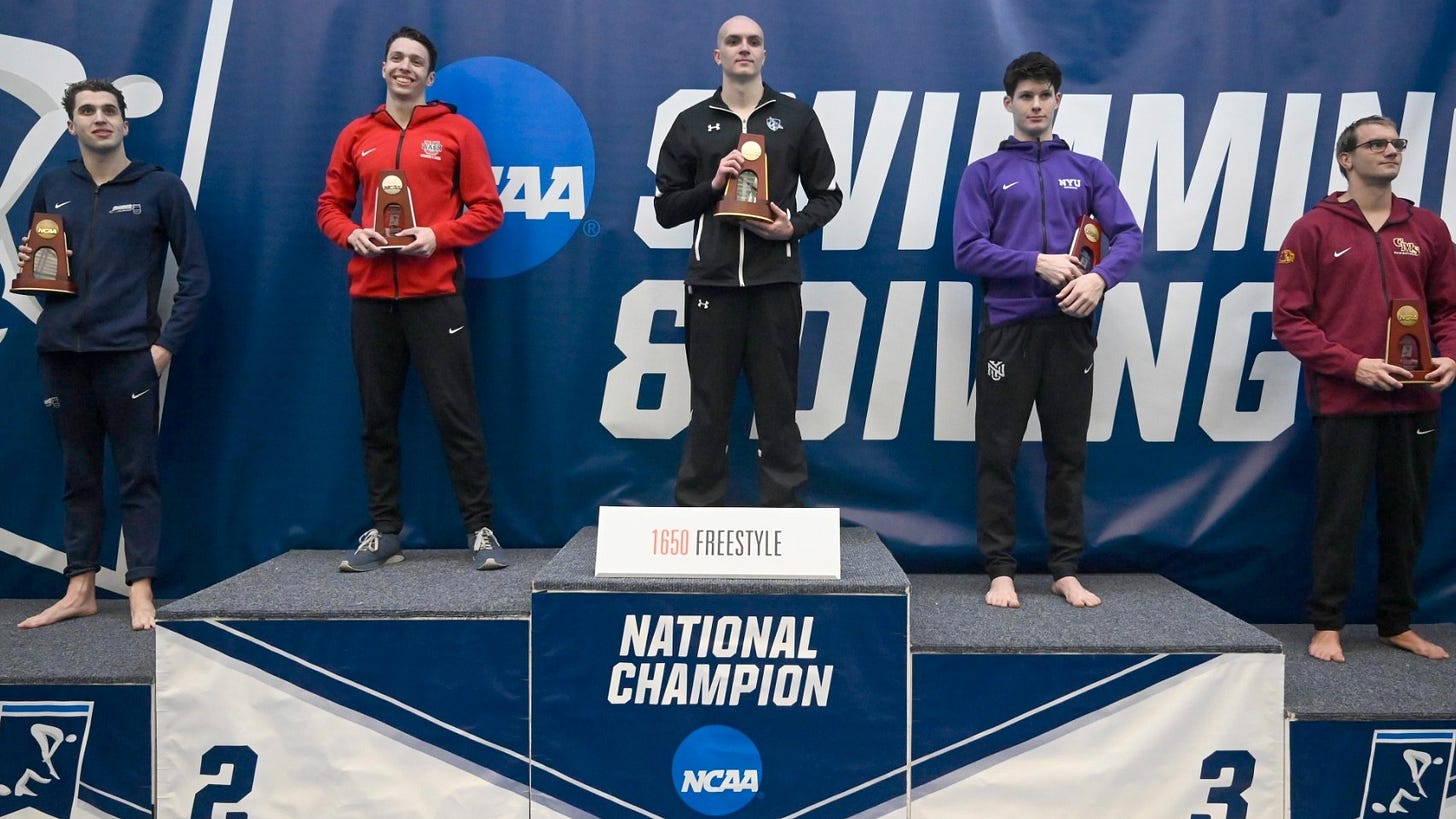
Kellen Roddy is a distance specialist at Johns Hopkins. To gauge Mr. Roddy's place in Division III mile swimming it helps to direct your gaze back to December 5, 2021. On that day, something happened to Mr. Roddy in a mile swim that no longer happens.
He lost.
Thomas Pritchard, NYU - 15:14.72
Kellen Roddy, JHU - 15:16.57It was the Bruno Invitational at Brown University. Mr. Roddy was a sort-of Sophomore. Thomas Pritchard of NYU, an older, slightly more experienced swimmer, beat Mr. Roddy in the mile by about 1.75 seconds.
Since then, no Division III opponent has beaten Kellen Roddy in the mile. At any point, through more than two seasons. In fact, only one opponent, Dylan Felt of Division I Davidson, beat Mr. Roddy, and it was by 0.85 seconds…in an event that was contested for more than 920 seconds. Even losing to a Division I opponent was unusual. Since December 2021, Mr. Roddy has beaten more than 35 Division I opponents in the 1650.6
Going into Nationals last year, Mr. Vincent was the number one seed, ahead of Mr. Roddy and his teammate Thomas Pritchard (who has since retired from D3 swimming). Kellen Roddy won at Nationals, posting the season's fastest time in the 1650.
This season Mr. Vincent is third behind Mr. Roddy and Rafae Shafi of Tufts.7 We do not know what to expect from Mr. Shafi, but Mr. Roddy and Mr. Vincent are far short of their best times from last year, and likely will be until that Saturday in March.
We are not suggesting that Connor Vincent is certain to catch Mr. Roddy in the mile. In fact, we aren’t sure it matters, and this brings up our second reason why this is a bad time to be a miler. If what Mr. Vincent cares about is the broader recognition of some day being named CSCAA Swimmer of the Year,8 winning the mile won’t help him.
The serious business of 500 Free
When it comes to 500 Free, Mr. Roddy is having the best season of his career, and his closest competition is once again Connor Vincent.
Men's 500 Free is in flux. Two seasons ago, Emory’s Pat Pema led the division in the 500 Free going into the 2022 Nationals, but was not able to win the event. The gold medal went to Kenyon's Bryan Fitzgerald, who won by dropping 3.5 seconds off his personal best...a personal best he swam earlier that day in prelims.
Mr. Fitzgerald also won the 400 IM en route to being named CSCAA Swimmer of the Year.9
Last season, Mr. Pema was on a mission.
Mr. Pema went under 4:23 at the Denison invite in December 2022, and going into 2023 Nationals, no one else had so much as gone under 4:24. In Prelims, Mr. Pema went under 4:22. And it was Mr. Roddy who fell behind the least, being the first athlete that season not named Pat Pema to break the 4:23 barrier. And none of that mattered because Mr. Pema was about to swim a 4:20.41 in finals.
So Mr. Roddy has been a factor in 500 Free, but never really threatened to win it. This season Mr. Roddy's relative rank among Division III athletes is better than ever, and this might be his year to win 500 Free.
Or maybe not. The chart below shows two trend lines. The blue trend line shows the direction of Mr. Roddy's times in 500 Free since 2021. That line looks flat, maybe not even. Mr. Vincent’s trendline is in purple. Keep in mind the vertical axis is measured in seconds, so down is good. And those lines look like they are intersecting in a way that would be favorable for Mr. Vincent.
Caveats abound, and obviously Mr. Roddy has already proven himself an elite distance swimmer. And in the end the athletes are not measured by who has the better trend line. But if they were, you'd rather have Mr. Vincent's.
Connor Vincent’s 200 Free can set him apart
Honestly, none of the stuff above is what got us curious. It’s Mr. Vincent’s 200 Free time that caught our attention. He’s third in the division, behind MIT’s Jaden Luo and reigning 200 Free national champion James McChesney.
Jaden Luo MIT MIT Invitational 1:37.24
James McChesney TCNJ TCNJ Invitational 1:37.84
Connor Vincent NYU Phoenix Fall Classic 1:38.39Right now Connor Vincent is third in the division in the mile, second in 500 Free, and third in 200 Free. And that is a combination that very very rarely happens.
It is that last part that is elusive. A miler who also excels at 500 Free is not that odd. But the 200 Free is a totally different game, and to be outstanding at all three is something we rarely see.
In fact, to find another athlete who finished a season top three in the mile and 200 Free, you have to go back to Tom Gordon of Emory, in the 2017-2018 season.
A few words about Tom Gordon
People swim for a host of reasons, and we cannot speak to the personal satisfaction that accrues to the athlete who excels in an event like the 1650 Free. All we are talking about here is how - when it comes to Men’s events and CSCAA Swimmer of the Year awards - swimming and dominating the mile gets you nothing.
Tom Gordon’s first Nationals was 2017, the year of Andrew Wilson. In terms of the swimmer of the year, there is nothing to discuss, though Mr. Gordon had a good meet, finishing third in the 500 Free, 3rd in the mile, and 2nd in the 200 Free.
The following season, at the 2018 Nationals, Tom Gordon won the 500 Free and the 1650.
Then, at 2019 Nationals, he did it again.
Now, four golds in two consecutive Nationals is not unheard of. But it is surprisingly uncommon. Rory Buck did it in 2011 and 2012. Marc Courtney-Brooks did it (twice) for Kenyon (2002-2004), and Aaron Cole did it for Denison in 1999 & 2000. And what all those guys have in common is that they won CSCAA Swimmer of the Year honors, some multiple times.10
It's so rare, you'd think people would notice when it happens. Yet somehow Tom Gordon, while doing something astonishing, for two years in a row, in the most conspicuous possible way, never got voted CSCAA Swimmer of the Year.
In 2018, the award went to Oliver Smith. Obviously Oliver Smith was great (he still holds two division records, in Men’s 50 Free and 100 Free) and contributed to Emory's successful relays in a way that Mr. Gordon did not. But they were both Freestylers (Oliver Smith did not A Final in his third individual event, 100 FL), and Mr. Gordon won two events and medaled in his third, claiming more medals than Mr. Smith.11
You can't take anything away from Oliver Smith. He is an absolute legend. But there was an argument for giving this award to Tom Gordon, too. Mr. Gordon was the points leader at the 2018 Nationals, won two events and held three medals.
In 2019, Tom Gordon again won the 500 and the mile. And this is where it starts to get a little weird. By the time the assembled coaches were voting in the CSCAA poll they would have known…
They would have known that Tom Gordon won two golds two years in a row.
They could have seen that Tom Gordon was the Men's points leader for the combined 2018 and 2019 Nationals.
For three years running (2017-2019) no one scored more points at Nationals than Tom Gordon.
At the 2019 Nationals, the points leader for just that meet was David Fitch, and Tom Gordon was right behind him. SwimCloud rates Mr. Gordon's swims more highly than Mr. Fitch's, more highly than anyone else in the meet.
Yet the CSCAA Swimmer of the Year award went to Sophomore David Fitch, not Senior Tom Gordon.
Obviously, Mr. Fitch was a fantastic athlete, was high-point for the meet, and medaled in all three individual events. But the same was true of Tom Gordon the year before. And Mr. Fitch of course contributed to three Kenyon relays, but only one of them medaled - the Kenyon 200 Free Relay came in third. Tom Gordon contributed to one relay, the Men's 800 Free Relay, and that relay finished second.
It is pretty hard to square. But unfair things happen, and they don't have to mean anything. We can all be victims of poor timing, unfortunate sequencing, and bad luck.
Except, what if it isn’t just bad luck?
There’s still the other guy, the guy we haven't gotten to yet. Al Weik.
Al Weik swam for Denison. Remember earlier when you guessed that, since 2006, Andrew Wilson had the most gold medals at Division III Nationals and you were wrong?
You were wrong because, since 2006, Al Weik has the most gold medals in D3 Nationals history. He has seven (Mr. Wilson has six).12
As a First-Year in 2011, Al Weik won the mile, and came in third in 500 Free. Quite the accomplishment, but Rory Buck won both the 100 and 200 Breast and was named CSCAA Swimmer of the Year.
In his Sophomore year, Al Weik won two golds - 500 Free and 1650 Free. In doing so he set new Division III records in both events. He also won silver in 400 IM. Zach Turk of Kenyon won the 50 Free and 100 Free, and came in third in 200 Free and was named Swimmer of the Year.
In his Junior year, Al Weik again won the 500 Free and the 1650 Free and again fnished second in the 400 IM. MIT's Wyatt Ubellacker won the 50 Free and 100 Fly and was named swimmer of the year.
Going into his Senior year, Al Weik had won 5 gold medals over the span of three consecutive Nationals, plus two silvers in the 400 IM, plus another bronze in the 500 Free. He again won the 500 Free and 1650 Free, and A finaled in the 400 IM.
Mary Washington's Hugh Anderson won the 200 Fly and 400 IM and was voted CSCAA Swimmer of the Year.
Here's the thing. Every recipient of the award - whether Mr. Anderson, Mr. Ubellacker, Mr. Turk or Mr. Buck - was a flat-out brilliant swimmer having a terrific season.
But think of that moment, at the end of 2014 Nationals. Mr. Weik is standing there.
Over four consecutive Nationals he has collected seven gold medals (more than any other swimmer of that era, and more than anyone since), two silver medals, and a bronze.
And he has scored as many points at Nationals over those four years as the four CSCAA Swimmer of the Year award winners combined.
He is - at that moment - holding the Division III records in 500 Free and 1650 Free, and those records had stood for years.
Al Weik had never won the CSCAA award. And the assembled coaches of the CSCAA voted for someone else?
We don't assume Tom Gordon or Al Weik know about this blog or care what we think. But if anyone at Emory or Denison can get a message to either athlete, please tell them we think they got robbed.
Are we saying that the coaches who vote on the CSCAA swimmer of the year, for some reason, utterly disregard accomplishments in the Men’s 1650 Free?
Yes, that is precisely what we are saying. If you think you have a better explanation, please, trot it out.
Connor Vincent, you are a young man and you have your whole life ahead of you. If swimming the mile gives you satisfaction, then good for you, go with God (as they say). But if you want the recognition of CSCAA Swimmer of the Year, and you are able to win multiple golds in a single nationals, they better be in events other than the mile.
The award is determined by a vote of head swimming coaches and head diving coaches. It is worth remembering that the CSCAA is not a unitary thing or a person, but rather a process by which a diverse set of interests within Division III swimming vote on awards and rankings. The CSCAA, perhaps because of it’s reach to those head coaches, and because it includes in the process SwimSwam and Swimming World, has a lot of prestige.
The CSCAA also recognizes Swim and Dive Coaches of the Year. Last year’s winners were Jason Weber, Chicago; Gregg Parini, Denison; Tomasz Rossa, Emory; and Ron Kontura, Kenyon.
Or, more accurately, their process produced this outcome, without any intended irony.
Both excellent teams of course.
We aren't the only ones of course. Look at any meet report on SwimCloud and winning an event is designated with a little gold medal icon, with a silver medal for second and a bronze medal for third. So we do not feel totally off base thinking about swimming outcomes - especially at Nationals - in terms of first, second and third, gold, silver and bronze.
The modern period of swimming, as we define it, spans from the 2006 Nationals to the present.
Establishing an objective periodization has been challenging. While USA Swimming's online data is available starting in Fall 2009, we extend this period slightly earlier, leveraging SwimCloud’s database, which includes fairly complete data beginning with the 2006 Nationals. For records before 2006, sources are limited. Meet reports are available in PDF format if you can find them, and SwimSwam maintains an archive of Division III Nationals results; however, this archive is incomplete for some years, like 1996 and 1997. Given these limitations, we consider data prior to 2006 problematic.
So, we will prioritize the period starting in 2006 in our history of Division III swimming.
It is also reasonable to ask: for information about Nationals event winners, why not just look at the annual ‘DIVISION III SWIMMING AND DIVING CHAMPIONSHIPS RECORDS BOOK’ published yearly by the NCAA.
Answer: it is inaccurate. And often in confusing ways. Take Al Weik. Here is a screenshot from page 10 showing a list of athletes who accumulated the most National championships (gold medals) during their careers.
We don’t see Al Weik’s name on the list of those with seven individual titles.
Now he does show up here, in the tally of those athletes that won an event four times in their career.
But not here in the tally of athletes who won an event three times.
Al Weik should also be on this second list - the three wins list - for the 500 Free. A different event. An event he won three times in his career.
And the information demonstrating that Al Weik won the 500 Free three times, and won seven individual titles (and should be on the ‘Individual Titles, Career - 7’ list), is present other places in the same document. Like page 13.
See that? Three wins in the 500 Free, and then four wins in the 1650…doesn’t that add up to seven?
If, post-COVID, you watched the Men's 1650 at Nationals, you've only ever seen Mr. Roddy win it.
But the times posted by these athletes suggest none have yet swum their best race (so far no swimmer has gone under 15:20). By the end of last year the top three finishers - Mr. Roddy, Mr. Vincent, and Mason Kelber of WashU - all went season's-best times under 15:20.
Which maybe he does not at all.
The 500 Free and 400 IM leading to a Swimmer of the Year award is an old-school Kenyon thing. Before Mr. Fitzgerald the only other athletes to win the award that way were Eric Dunn (Kenyon, 2007) and Elliot Rushton (Kenyon, 2005). They also won the mile, not that it matters.
Here is the list of some of the best swimmers in the history of Division III who never won multiple gold medals in consecutive Nationals: Andrew Wilson, Zach Turk, Benjamin Lin, Oliver Smith, Jack Lindell, Alex Anderson, Wyatt Ubellacker, Harrison Curley and Arthur Conover.
Tom Gordon swam in only one relay - the 800 Free Relay - and that Emory relay did not medal. But that's not on Tom Gordon. He led off and when he got out of the water, Emory was second only to eventual event winners Denison.
Mr. Weik is actually tied with Kenyon’s Marc Courtney-Brooks. They both have seven gold medals. In the process of collecting those seven golds, Marc Courtney-Brooks won CSCAA Swimmer of the Year three times. And no, the mile was not one of his events. Andrew Wilson, of course, collected two Swimmer of the Year awards while winning his six gold medals.




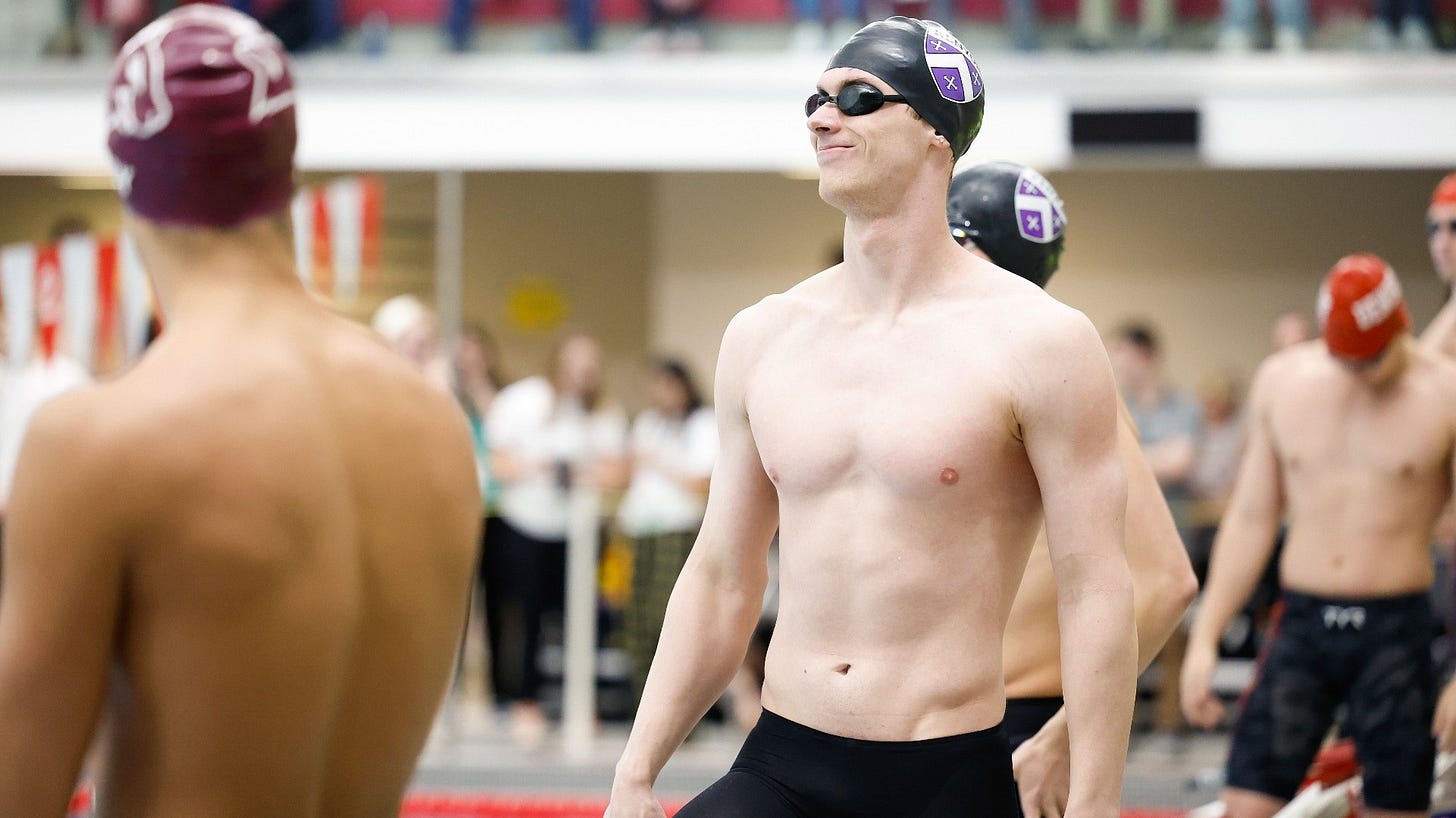


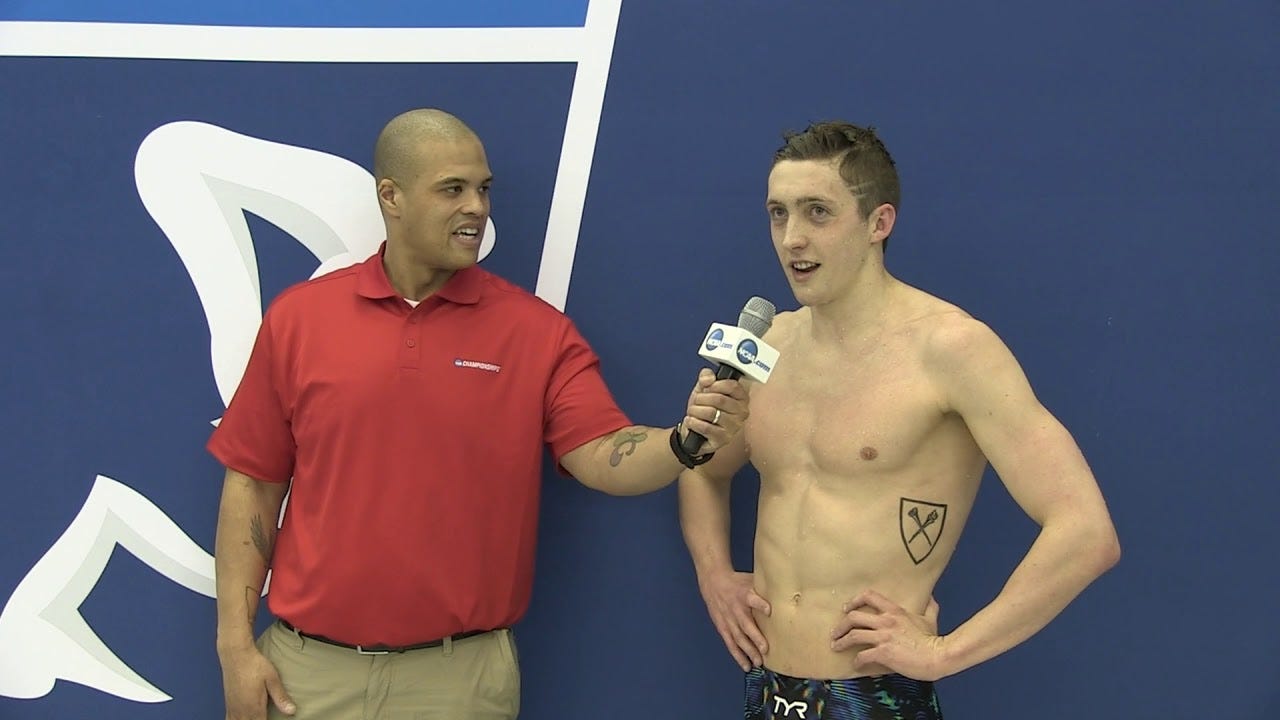
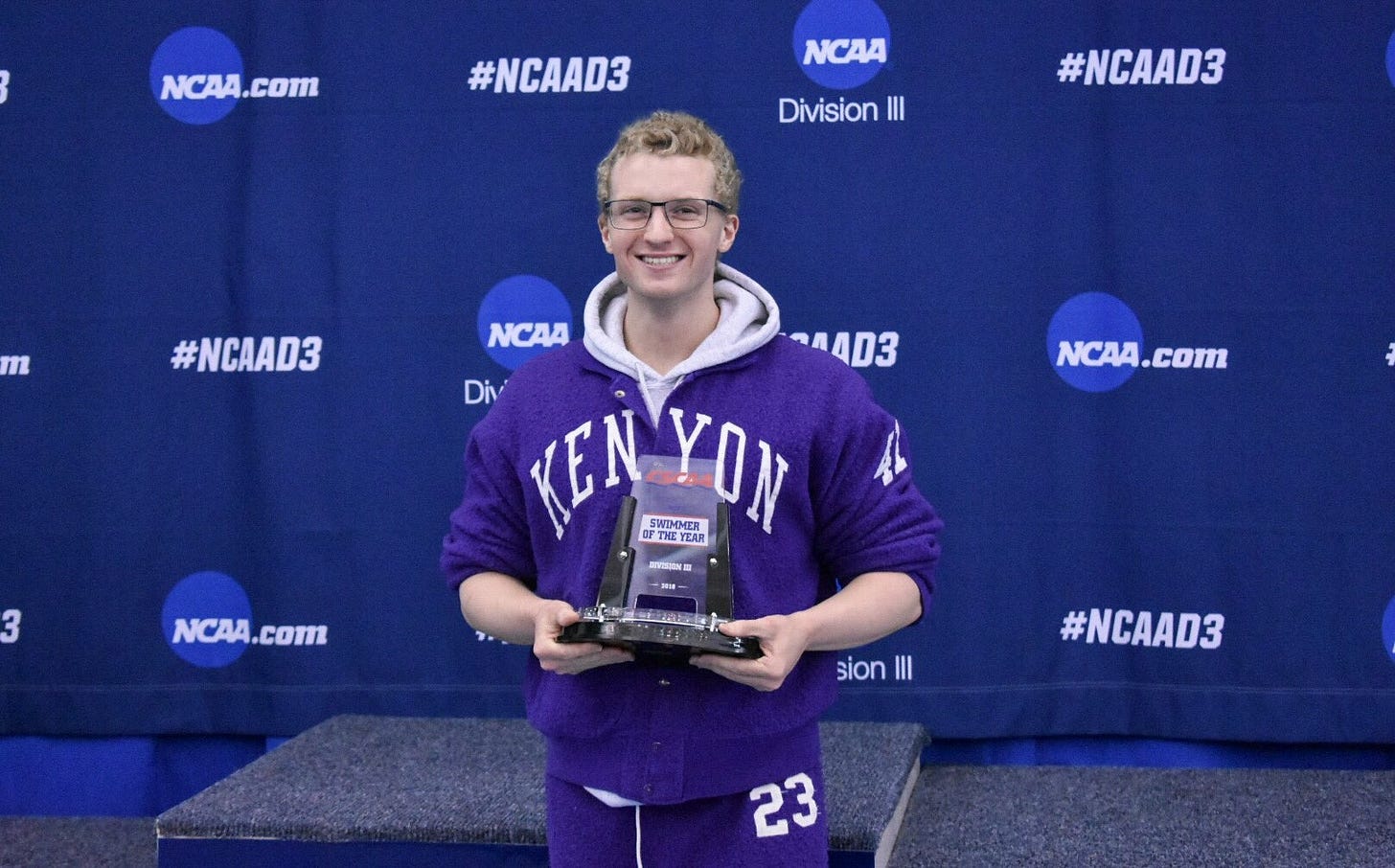


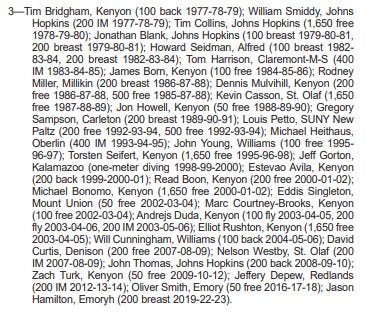

Vincent or Roddy won’t win the 500
…Im pretty sure Kellen is the purple times though?